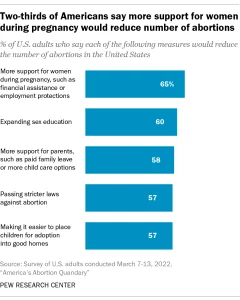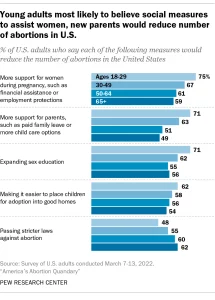There is the question of whether abortion should be legal in the United States, but there’s also a separate question about whether restricting abortion effectively reduces the number of procedures done.
Abortion opponents believe outlawing abortion is the best way to reduce the number of abortions performed. However, that attitude is not shared by a majority of American adults. More Americans believe providing more support for women during pregnancy, such as through financial assistance or employment protections, would reduce the number of abortions performed.
Typically, the religious and political conservatives who want to ban abortion also are against government spending on social welfare programs and workplace protection laws — the very things 65% of American adults say would be more effective than outlawing abortion.
 The findings come from a new national survey by Pew Research Center.
The findings come from a new national survey by Pew Research Center.
Asked what measures would reduce the number of abortions in the United States, Americans list passing restrictive abortion laws fourth — behind financial and workplace support for women, expanded sex education, and paid family leave, all things religious and political conservatives oppose.
Not surprisingly, “there are large gaps on some of these questions by political affiliation, age and gender,” the Pew report notes. “For example, two-thirds of Republicans and independents who lean toward the Republican Party say passing stricter laws against abortion would reduce the number of abortions, compared with about half of Democrats and Democratic leaners (49%). Republicans also are more likely than Democrats to say making it easier to place children for adoption into good homes would reduce the number of abortions in America (64% vs. 52%).”
On the other hand, Democrats “are much more likely than Republicans to say expanding sex education would reduce the number of abortions (70% vs. 50%). Democrats also are more likely than their GOP counterparts to say providing more support for parents (64% vs. 53%) and providing more support for women during pregnancy (69% vs. 62%) would reduce the prevalence of abortion.”
Women and men of typical childbearing and child-rearing ages tend to favor family support and social services over strict laws. Among adults 18 to 29 less than half (48%) support stricter laws as the answer, compared to 25% of those age 65 and older.
Likewise, 67% of those ages 30 to 49 believe greater support for women would be more effective than passing strict laws.
Older adults are more likely than those who are younger to say passing stricter laws against abortion would reduce the number of them that occur in the U.S., with 62% of those ages 65 and older saying this, compared with 48% of those ages 18 to 29.
 Overall, belief in stricter laws against abortion increases with age, while support for women who are pregnant or who are working mothers decreases with age.
Overall, belief in stricter laws against abortion increases with age, while support for women who are pregnant or who are working mothers decreases with age.
Pew reported that age and political affiliation are greater indicators of one’s position on these questions than gender. “Men are notably more likely than women to say passing stricter laws against abortion would reduce the number of abortions (63% vs. 52%), but in the case of the other four measures presented to respondents, differences between men and women are modest or nonexistent.”
A gender gap does show up, however, when filtered through other demographics, Pew reported. “For example, Republican men (71%) are substantially more likely than Democratic women (45%) to say passing stricter laws against abortion would reduce the number of abortions in the U.S.; Republican women (63%) and Democratic men (56%) fall between these two groups on this question.”
The group most likely to see providing more support for women during pregnancy as the best deterrent to abortion is women under age 50 — the very people most likely to get pregnant.
Related articles:
American support for abortion rights at highest level since 1995, Gallup says
The tangled web of evangelical opposition to abortion while believing in original sin, eternal conscious torment and the mysterious age of accountability | Analysis by Rick Pidcock
The European option: Why we need a third way on abortion | Analysis by Alan Bean


